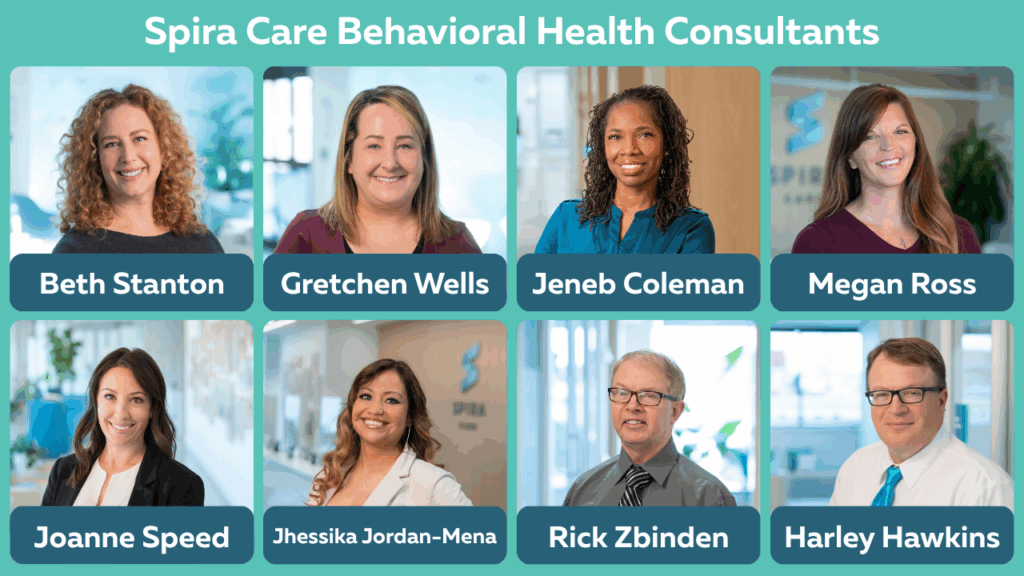
Suicide Prevention and Awareness: What You Need to Know from Spira Care Behavioral Health Consultant Rick Zbinden
Suicide is one of the leading causes of death in the United States and impacts people of all ages, according to the CDC.
- In 2023, there were more than 49,000 deaths by suicide, with one suicide death happening every 11 minutes.
- In 2023 alone, 12.8 million adults reportedly seriously considered suicide.
- Suicide was the second leading cause of death for people ages 10-34.
Suicide Risk Factors
The CDC points to these warning signs for suicide:
- Increased anger or rage
- Expressing hopelessness
- Sleeping too little or too much
- Increased anxiety
“We’re seeing increasing anxiety, along with depression, as people are feeling more stressed about their lives and have increased fear for the future,” Spira Care Behavioral Health Consultant Rick Zbinden said.
According to the Substance Abuse and Mental Health Services Administration (SAMHSA), some of the major risk factors for suicide include:
- Misuse and abuse of alcohol or other drugs
- Access to lethal means
- Chronic disease and disability
- Mental disorders, particularly depression and other mood disorders
- Social isolation
“In 2024, the U.S. Surgeon General said we have a loneliness epidemic,” Zbinden said. “We used to be a society where neighborhoods and civic groups would support each other. Now, it feels like everyone is on their phone, and that overreliance on technology can increase social isolation.”
Suicide Prevention
“I think you have to be up front with folks and not skirt the issue,” Zbinden said. “You’re not going to make someone more likely to harm themselves by talking about it. If you handle it well, it can be lifesaving.”
SAMHSA points to these major protective factors, which are personal or environmental characteristics that help protect people from suicide:
- Effective behavioral healthcare
- Connectedness to individuals, family, community and social institutions
- Self-esteem and a sense of purpose or meaning in life
- Life skills (including problem solving skills and coping skills, ability to adapt to change)
“If someone is not imminently ready to self-harm, we look at minimizing the risk factors and increasing the protective factors,” Zbinden said.
Zbinden says safety planning is important for suicide prevention.
“If you are struggling, ask yourself, ‘who might I talk to? What might I do to self-soothe?’ This can be simple, like going for a walk or petting your dog. It’s about what you can do to help get you through that moment. I always want people to know they can contact the 988 Suicide & Crisis Lifeline, whether it’s for themselves or for someone else. The 988 counselors can give resources and coaching.”
The Spira Care Behavioral Health Model
For those on a Blue KC plan with exclusive access to Spira Care, you have access to behavioral health support for your whole family. Appointments with a Behavioral Health Consultant are available with a referral from your Spira Care Primary Care Provider. A Behavioral Health Consultant (BHC) is a licensed mental health clinician who can help you navigate difficult situations, health conditions and the challenges of every phase of life, including:
- Stress and anxiety
- Depression
- Sleep issues
- Managing chronic health conditions (examples: diabetes, high blood pressure, pain management)
- Substance misuse (examples: alcohol, tobacco, vaping, weight issues)
- And more
Meet the Spira Care Behavioral Health Consultants Team

Beth Stanton, Spira Care Olathe: “The Spira model is unique in that behavioral health is embedded within a primary care clinic. This allows for early intervention for a variety of issues before situations get worst.”
Gretchen Wells, Spira Care Lee’s Summit: “I love my job because I get to walk alongside people in their hardest moments and help them see hope and possibility again.”
Jeneb Coleman, Spira Care Independence: “Working with a Spira Care BHC can provide an essential resource for patients to feel more control in their health journey by connecting medical goals to daily action steps, which decreases medical anxiety.”
Megan Ross, Spira Care Wyandotte and Tiffany Springs: “Many patients have found that even a few sessions can make a meaningful difference. We’re here to listen, not to judge, and to walk alongside them at their own pace.”
Joanne Speed, Spira Care Shawnee: “I joined Spira Care because I believe behavioral health services should be seen as a standard part of traditional healthcare and be accessible for anyone.”
Jhessika Jordan-Mena, Spira Care Overland Park: “I love that I can utilize my skills to help patients in need and seeing their individual progress is the most rewarding feeling. Also, being the only bilingual BHC at Spira Care brings another opportunity to Spanish speaking patients who feel more comfortable in connecting with someone who speaks their own language.”
Rick Zbinden, Spira Care Crossroads: “No one is immune to mental health challenges. Seeking help does not mean you are “weak” or “failing” in any way.”
Harley Hawkins, Spira Care Liberty: “We provide behavioral health warm handoffs, which mean members can have access to behavioral health intervention almost immediately when they come to the center.”
Sources: CDC, SAMHSA, 988
Disclaimer: If you are experiencing a medical emergency, call 911 or go to the nearest Emergency Department. In case of a mental health emergency, call or text 988.


